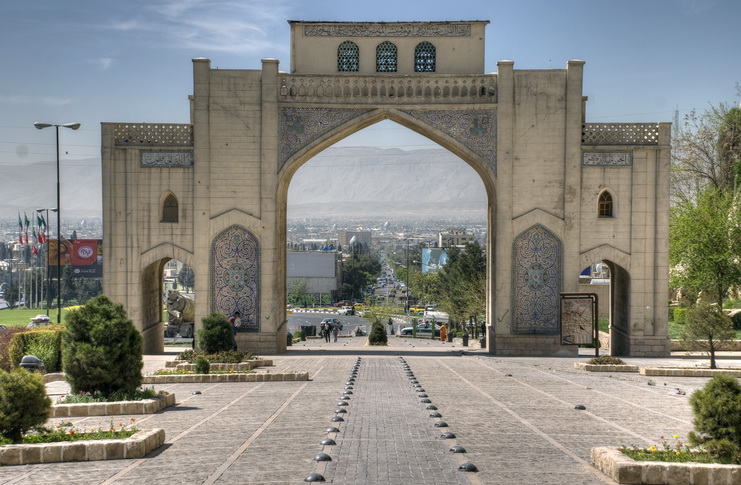Qur'an gate on:
[Wikipedia]
[Google]
[Amazon]
 Qur'an Gate ( fa, دروازه قرآن) or Shiraz Gate ( fa, دروازه شیراز) is a historic gate in the north of
Qur'an Gate ( fa, دروازه قرآن) or Shiraz Gate ( fa, دروازه شیراز) is a historic gate in the north of
Panoramic Photography from 2015 of Qur'an Gate
Architecture in Iran Buildings and structures completed in the 10th century Buildings and structures in Shiraz City gates Tourist attractions in Shiraz {{Iran-stub
 Qur'an Gate ( fa, دروازه قرآن) or Shiraz Gate ( fa, دروازه شیراز) is a historic gate in the north of
Qur'an Gate ( fa, دروازه قرآن) or Shiraz Gate ( fa, دروازه شیراز) is a historic gate in the north of Shiraz
Shiraz (; fa, شیراز, Širâz ) is the List of largest cities of Iran, fifth-most-populous city of Iran and the capital of Fars province, Fars Province, which has been historically known as Pars (Sasanian province), Pars () and Persis. As o ...
, Iran
Iran, officially the Islamic Republic of Iran, and also called Persia, is a country located in Western Asia. It is bordered by Iraq and Turkey to the west, by Azerbaijan and Armenia to the northwest, by the Caspian Sea and Turkmeni ...
. It is located at the northeastern entrance of the city, on the way to Marvdasht
Marvdasht ( fa, مرودشت, also romanized as Marv Dasht) is a city and the capital of Marvdasht County, Fars Province, Iran. At the 2006 census, its population was 123,858, in 29,134 families.
Name
Some historians hold that Marvdasht was o ...
and Isfahan
Isfahan ( fa, اصفهان, Esfahân ), from its Achaemenid empire, ancient designation ''Aspadana'' and, later, ''Spahan'' in Sassanian Empire, middle Persian, rendered in English as ''Ispahan'', is a major city in the Greater Isfahan Regio ...
, between Baba Kouhi and Chehel Maqam Mountains near Allahu Akbar gorge.Shiraz MunicipalityHistory
The Gate was first built during the reign of'Adud ad-Dawla
Fannā (Panāh) Khusraw ( fa, پناه خسرو), better known by his laqab of ʿAḍud al-Dawla ( ar, عضد الدولة, "Pillar of the bbasidDynasty") (September 24, 936 – March 26, 983) was an emir of the Buyid dynasty, ruling from 9 ...
. By the time of the Zand dynasty
The Zand dynasty ( fa, سلسله زندیه, ') was an Iranian dynasty, founded by Karim Khan Zand (1751–1779) that initially ruled southern and central Iran in the 18th century. It later quickly came to expand to include much of the rest of ...
, it had sustained a lot of damage, so it was restored and a small room on top was added, in which were kept hand-written Qur’āns by Sultan Ibrahim Bin Shahrukh Gurekani
Ibrahim Sultan ( fa, ابراهيم سلطان بن شاهرخ) (Shawwāl 796 AH/August 1394 AD – Shawwāl 838 AH/ May 1435 AD) was a Timurid prince who governed a region around modern Fars from 1415 to 1435 under his father Shah Rukh. He ...
. The two Qur’āns are known as Hifdah-Man. Travelers passing underneath the gates were believed to receive the blessing of the Holy Book as they began their trip or journey from Shiraz.
During the Qajar dynasty
The Qajar dynasty (; fa, دودمان قاجار ', az, Qacarlar ) was an IranianAbbas Amanat, ''The Pivot of the Universe: Nasir Al-Din Shah Qajar and the Iranian Monarchy, 1831–1896'', I. B. Tauris, pp 2–3 royal dynasty of Turkic peoples ...
, the gate was damaged by multiple earthquakes; it was later restored by Mohammad Zaki Khan Nouri. In 1937 the two Qur’āns were taken from the gate and were taken to the Pars Museum in Shiraz, where they remain today. In 1949 the arch of the gate was restored by Hosein Igar, a merchant also known as E'temad Al-Tojar.
Today the gates are part of a city park where Shirazis relax and picnic during their leisure hours.
References
External links
Panoramic Photography from 2015 of Qur'an Gate
Architecture in Iran Buildings and structures completed in the 10th century Buildings and structures in Shiraz City gates Tourist attractions in Shiraz {{Iran-stub